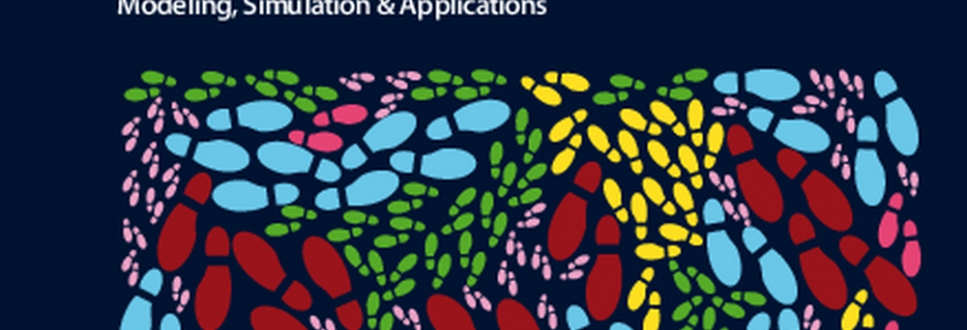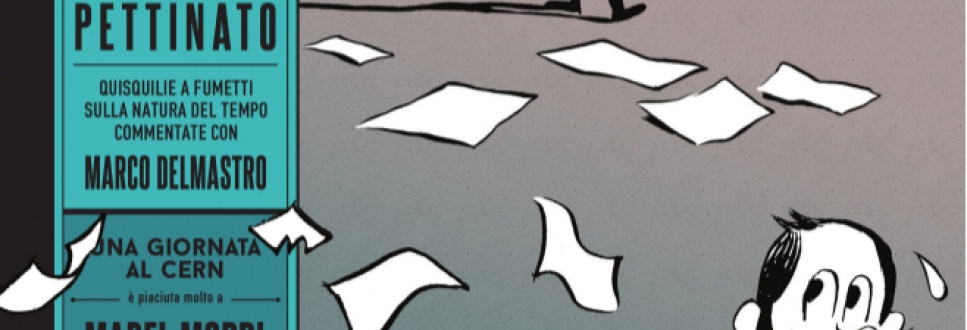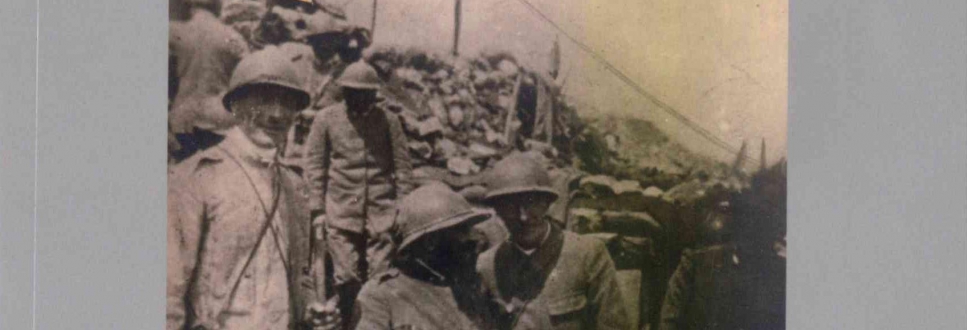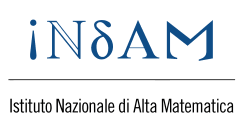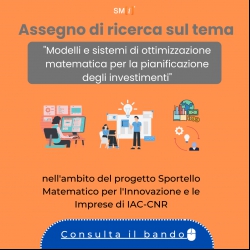
Notiziario dei Seminari di Matematica a Roma -- Settimana dall'8 al 14 ottobre 2012
2012-10-05
Notiziario dei Seminari di Matematica a Roma -- Settimana dall'8 al 14 ottobre 2012, a cura del DIPARTIMENTO DI MATEMATICA, UNIVERSITA' DI ROMA "LA SAPIENZA".
Lunedi' 8 ottobre 2012
Ore 14:30, Aula di Consiglio
Seminario di Analisi Matematica
Daniele Bartolucci (Universita' di Roma II)
Disuguaglianze di tipo Moser-Trudinger con pesi ed equazioni di
Liouville con dati singolari
L'analisi dell'equazione di Liouville con dati singolari suggerisce
naturalmentre lo studio di una disuguaglianza di tipo Moser-Trudinger
con peso. Dopo una introduzione al problema e alle sue motivazioni,
discuteremo una nuova disuguaglianza pesata di tipo Moser-Trudinger
ottenuta imponendo un vincolo non-radiale sulla distribuzione di
massa. Discuteremo poi alcuni nuovi risultati di esistenza per
l'equazione di Liouville singolare nel caso sopracritico sui domini
semplicemente connessi e sulla sfera. Questi risultati sono stati
ottenuti in un recente lavoro in collaborazione con A. Malchiodi.
Martedi' 9 ottobre 2012
Ore 15:00, Aula di Consiglio
Seminario di Modellistica differenziale numerica
Elisabetta Carlini (Universita' di Roma I)
Uno schema semi-lagrangiano per il moto per curvatura media e sue
estensioni
Presentero' uno schema semi-lagrangiano per il moto per curvatura
media. L'approssimazione si ottiene accoppiando un metodo stocastico
per l'approssimazione delle caratteristiche, da intendersi in modo
generalizzato, con un operatore di interpolazione locale. La
principale caratteristica di tale schema e' permettere lunghi passi in
tempo. Lo schema puo' essere adattato ad approssimare diversi tipi di
equazioni paraboliche e degeneri. Discutero' due estensione dello
schema: una al moto per curvatura media che preserva l'area ed una al
modello Affine Morphological Scale Space. Analizzero' un risultato di
convergenza per una versione modificata dello schema e presentero'
qualche test numerico.
Martedi' 9 ottobre 2012
Ore 16:00, Aula D'Antoni, Universita' di Roma II
Seminario di Analisi Complessa
Tatsuo Suwa (Universita' di Hokkaido)
Degeneracy loci problem via localization
Let Sigma:E -> F be a homomorphism of complex vector bundles on a
manifold M. The Thom-Porteous formula says that the homology class of
a degeneracy locus of Sigma is the Poincare' dual of a certain Chern
polynomial of the virtual bundle F-E. We refine this by constructing a
natural localization of the latter, localized at the degeneracy locus,
and showing the equality in the Alexander duality. This approach works
for more general problems and also in the case M is possibly a
singular variety. It is done by constructing a universal localization
in this situation, which generalizes the notion of the Thom class for
the case of the top Chern class of a vector bundle. This is a joint
work with Toru Ohmoto of Hokkaido University.
Mercoledi' 10 ottobre 2012
Ore 14:30, Aula di Consiglio
Seminario di Algebra e Geometria
Ruggero Bandiera (Universita' di Roma I)
A homotopical construction of higher derived bracket
We show how to recover and generalize Voronov's construction of
L-infinity structures via higher derived brackets using standard
homology perturbation theory and Fiorenza-Manetti's L-infinity
structure on the mapping cone of a morphism of DGLAs. In the end we
discuss applications in Poisson geometry: let X a Poisson manifold, Z
a coisotropic submanifold, we show the homotopy Lie algebroid
introduced by Oh-Park, Cattaneo-Felder to govern coisotropic
deformations of Z in X to be homotopy equivalent to a DGLA we recently
constructed in joint work with M. Manetti to the same end.
Giovedi' 11 ottobre 2012
Ore 14:00, Aula D'Antoni, Universita' di Roma II
Dynamical Systems working seminars
Peyman Eslami (Universita' di Roma II)
Singular limits of absolutely continuous invariant measures for
families of transitive maps
We investigate the dependence on the parameters of absolutely
continuous invariant measures for a family of piecewise linear
piecewise expanding maps. We construct an example to show that the
transitivity of the maps does not imply the convergence of those
measures to the absolutely continuous invariant measure for the limit
map. When we deal with piecewise expanding maps, we know that for each
of them an acim exists, as was proved by Lasota and Yorke. Moreover,
if the map is transitive, then this measure is unique (it follows
immediately from the results of Li and Yorke). Consider the case when
there is an invariant interval such that the trajectory of almost
every point falls into this interval, and the map restricted to this
interval is transitive. Then there is also a unique acim, and it is
supported by this invariant interval. Keller used this property to
construct an example (the so called "W map") in which such an interval
exists for some interval of parameters, and as the parameter converges
to a limit value, those intervals become shorter and shrink to a
point. Then the weak-* limit of acims is a measure concentrated at one
point, while the limit map is transitive and has an acim with the
support equal to the whole phase space. He conjectured that this is
the only mechanism in which the continuity of the acims can be
violated. We show that other mechanisms can exist. We will describe
Keller's example, construct our own example, and compute the invariant
density and limit measures. Finally, we look what happens if the
slopes on laps (intervals of monotonicity) are constant as in Keller's
example. The presentation is based on a joint work with Michal
Misiurewicz.
Giovedi' 11 ottobre 2012
Ore 14:30, Aula di Consiglio
Seminario P(n): Problemi differenziali non lineari
Maria Michaela Porzio (Universita' di Roma I)
Effetto regolarizzante e proprieta' di decadimento di alcuni problemi
parabolici
======================================================================
Tutte le informazioni relative a questo notiziario devono pervenire
all'indirizzo di posta elettronica seminari@mat.uniroma1.it
o nella casella della posta di Luigi Orsina, entro le ore 9 del venerdi'
precedente la settimana di pubblicazione.
Tutti coloro che desiderano ricevere questo notiziario via e-mail sono
invitati a comunicare il proprio indirizzo di posta elettronica a
seminari@mat.uniroma1.it

LINK: http://www.mat.uniroma1.it/ricerca/seminari.htmlOre 14:30, Aula di Consiglio
Seminario di Analisi Matematica
Daniele Bartolucci (Universita' di Roma II)
Disuguaglianze di tipo Moser-Trudinger con pesi ed equazioni di
Liouville con dati singolari
L'analisi dell'equazione di Liouville con dati singolari suggerisce
naturalmentre lo studio di una disuguaglianza di tipo Moser-Trudinger
con peso. Dopo una introduzione al problema e alle sue motivazioni,
discuteremo una nuova disuguaglianza pesata di tipo Moser-Trudinger
ottenuta imponendo un vincolo non-radiale sulla distribuzione di
massa. Discuteremo poi alcuni nuovi risultati di esistenza per
l'equazione di Liouville singolare nel caso sopracritico sui domini
semplicemente connessi e sulla sfera. Questi risultati sono stati
ottenuti in un recente lavoro in collaborazione con A. Malchiodi.
Martedi' 9 ottobre 2012
Ore 15:00, Aula di Consiglio
Seminario di Modellistica differenziale numerica
Elisabetta Carlini (Universita' di Roma I)
Uno schema semi-lagrangiano per il moto per curvatura media e sue
estensioni
Presentero' uno schema semi-lagrangiano per il moto per curvatura
media. L'approssimazione si ottiene accoppiando un metodo stocastico
per l'approssimazione delle caratteristiche, da intendersi in modo
generalizzato, con un operatore di interpolazione locale. La
principale caratteristica di tale schema e' permettere lunghi passi in
tempo. Lo schema puo' essere adattato ad approssimare diversi tipi di
equazioni paraboliche e degeneri. Discutero' due estensione dello
schema: una al moto per curvatura media che preserva l'area ed una al
modello Affine Morphological Scale Space. Analizzero' un risultato di
convergenza per una versione modificata dello schema e presentero'
qualche test numerico.
Martedi' 9 ottobre 2012
Ore 16:00, Aula D'Antoni, Universita' di Roma II
Seminario di Analisi Complessa
Tatsuo Suwa (Universita' di Hokkaido)
Degeneracy loci problem via localization
Let Sigma:E -> F be a homomorphism of complex vector bundles on a
manifold M. The Thom-Porteous formula says that the homology class of
a degeneracy locus of Sigma is the Poincare' dual of a certain Chern
polynomial of the virtual bundle F-E. We refine this by constructing a
natural localization of the latter, localized at the degeneracy locus,
and showing the equality in the Alexander duality. This approach works
for more general problems and also in the case M is possibly a
singular variety. It is done by constructing a universal localization
in this situation, which generalizes the notion of the Thom class for
the case of the top Chern class of a vector bundle. This is a joint
work with Toru Ohmoto of Hokkaido University.
Mercoledi' 10 ottobre 2012
Ore 14:30, Aula di Consiglio
Seminario di Algebra e Geometria
Ruggero Bandiera (Universita' di Roma I)
A homotopical construction of higher derived bracket
We show how to recover and generalize Voronov's construction of
L-infinity structures via higher derived brackets using standard
homology perturbation theory and Fiorenza-Manetti's L-infinity
structure on the mapping cone of a morphism of DGLAs. In the end we
discuss applications in Poisson geometry: let X a Poisson manifold, Z
a coisotropic submanifold, we show the homotopy Lie algebroid
introduced by Oh-Park, Cattaneo-Felder to govern coisotropic
deformations of Z in X to be homotopy equivalent to a DGLA we recently
constructed in joint work with M. Manetti to the same end.
Giovedi' 11 ottobre 2012
Ore 14:00, Aula D'Antoni, Universita' di Roma II
Dynamical Systems working seminars
Peyman Eslami (Universita' di Roma II)
Singular limits of absolutely continuous invariant measures for
families of transitive maps
We investigate the dependence on the parameters of absolutely
continuous invariant measures for a family of piecewise linear
piecewise expanding maps. We construct an example to show that the
transitivity of the maps does not imply the convergence of those
measures to the absolutely continuous invariant measure for the limit
map. When we deal with piecewise expanding maps, we know that for each
of them an acim exists, as was proved by Lasota and Yorke. Moreover,
if the map is transitive, then this measure is unique (it follows
immediately from the results of Li and Yorke). Consider the case when
there is an invariant interval such that the trajectory of almost
every point falls into this interval, and the map restricted to this
interval is transitive. Then there is also a unique acim, and it is
supported by this invariant interval. Keller used this property to
construct an example (the so called "W map") in which such an interval
exists for some interval of parameters, and as the parameter converges
to a limit value, those intervals become shorter and shrink to a
point. Then the weak-* limit of acims is a measure concentrated at one
point, while the limit map is transitive and has an acim with the
support equal to the whole phase space. He conjectured that this is
the only mechanism in which the continuity of the acims can be
violated. We show that other mechanisms can exist. We will describe
Keller's example, construct our own example, and compute the invariant
density and limit measures. Finally, we look what happens if the
slopes on laps (intervals of monotonicity) are constant as in Keller's
example. The presentation is based on a joint work with Michal
Misiurewicz.
Giovedi' 11 ottobre 2012
Ore 14:30, Aula di Consiglio
Seminario P(n): Problemi differenziali non lineari
Maria Michaela Porzio (Universita' di Roma I)
Effetto regolarizzante e proprieta' di decadimento di alcuni problemi
parabolici
==============================
Tutte le informazioni relative a questo notiziario devono pervenire
all'indirizzo di posta elettronica seminari@mat.uniroma1.it
o nella casella della posta di Luigi Orsina, entro le ore 9 del venerdi'
precedente la settimana di pubblicazione.
Tutti coloro che desiderano ricevere questo notiziario via e-mail sono
invitati a comunicare il proprio indirizzo di posta elettronica a
seminari@mat.uniroma1.it



